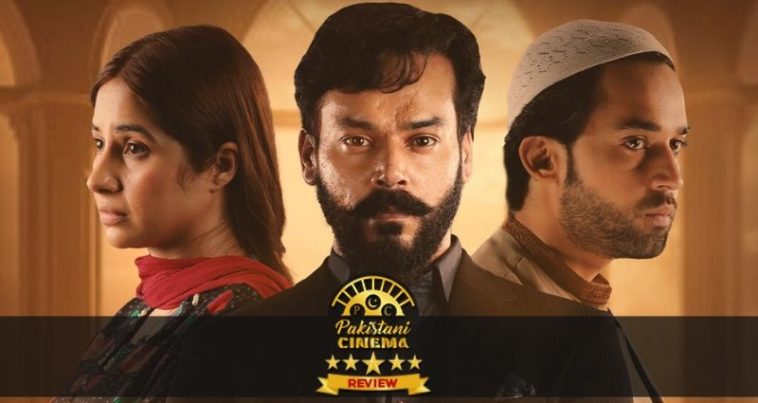One can find both suffocation and relief in the Zafar Mairaj-Kashif Nisar school of storytelling. So watching “Mann Jogi” is like treading through a full-bloom garden on a hot spring day. The stifling humidity goes hand in glove with the visual respite.The duo’s last outing, “Kabuli Pulao”, was a longer series with more characters and side tracks but “Mann Jogi”, a nine-episode mini-series starring Sabeena Farooq, Bilal Abbas Khan and Gohar Rashid in lead roles, is more compact, and trimmed down with a familiar treatment.
Both shows resist mainstream excesses in their writing and direction but owing to its length, “Mann Jogi” is more self-contained and for the first few episodes, is a run-and-chase thriller together with flashbacks and back and forth narration. Like “Kabuli Pulao”, it centers on a marriage dragging through a nexus of faith-based mohalla culture, administrative bullying, perils of video technology and inherent patriarchy of our social structures. Somewhere in this muddle, the purest seed of love blossoms.
“Mann Jogi”, helmed by Sultana Siddiqui, starts off with an attempted halala, a misused Islamic practice, whereby a man can remarry his ex-wife after she is married to and shortly divorced by another man. When Shabbir (a menacing Gohar Rasheed) forces Aliya (Sabeena Farooq) into a secret nikkah with a local muezzin and errand boy, Ibrahim (Bilal Abbas Khan) for one night, it sets off a chain of events beyond anyone’s control. Personas collapse, and identities emerge in a carefully woven tale that casually crashes gender roles and subverts romantic tropes without making a statement out of it. Or perhaps there is one statement: A belief system that can destroy and malign people and relationships, also has the power to sanctify, protect and elevate them.
“Mann Jogi” gives us a female protagonist who isn’t discovering as much as rediscovering herself. Aliya has a childlike stubbornness. We see it as soon as she is alone in the room with Ibrahim on the night of their nikkah. She is dead set on never going back to Shabbir, even if that comes at the cost of her life. Raised to be fiercely independent, Aliya is introduced as a perfectly dolled up and demure housewife to Shabbir. The wish to become an electrical engineer mutely vanished under thick layers of makeup and silk shawls. We are told that she played the boy in the girl-boy wedding dance, hinting at the girl Aliya used to be before she was tethered – quite literally – into bejeweled rings of womanhood.
There is a cut in the very first episode that essentially gives away Aliya’s backstory. The shot of her feet, dangling from a fan is cut to a shot of her henna-laden feet on her wedding night with Shabbir. The irony is that the first shot feels more empowering. The power of “Mann Jogi” lies in this moment and in many others where women’s infantilization (Aliya is referred to as a paon ki jooti in one scene) and trivialisation of their desires is par for the course in a girl’s journey into female-hood.
Ibrahim’s repression goes further back. Traumatized upon losing his family in an earthquake, he finds sanctuary in the never-changing rituals of faith and domesticity of a masjid. When he is forced to elope with Aliya, he is like a girl who has never set foot outside her house. Ibrahim’s struggle too is rooted in his inability to survive in the real world. We know that in their story, Aliya would be one leading their marriage, and he will be more than willing to surrender himself to her will. Their arrangement makes perfect sense because Ibrahim’s docility unwittingly brings out the woman Aliya was supposed to be if her father had not been killed in a mob attack.
Pakistani dramas have seen plenty of Bilal Abbas Khan play some variation of a hunched, servile, bumbling beta male trailing at the heels of a dominant, feisty leading lady. O Rangreza’s Qasim, Pyar Ke Saqkay’s Abdullah and more recently Ishq Murshid’s Fazal Baksh come to mind. The boyish innocence, the big, rounded, easily wounded eyes make him perfect for such a role. But unlike all these characters, Bilal is physically and verbally restrained by Ibrahim’s submissiveness. It is not until the last episode’s final moments where he takes initiative and has more dialogues that Bilal is allowed a shred of traditional heroics. Ibrahim can’t even bike across a dark street to get Aliya away from her abusive ex-husband without falling off it.
We are so used to watching Bilal Abbas as a smooth mover who acts with every inch of his face that Ibrahim’s blank eyes and defeatist posture unsettle us. The years of isolation, and anxiety have made him too scared, too slow to react but even in his inertia, Ibrahim is hard to dismiss perhaps because he is being portrayed by a popular actor who has had years of accumulated identity on him.
Sabeena Farooq on the other hand, smoothly fits into a role that requires her to be strong and vulnerable. Maybe it is the “Kabuli Pulao” hangover, but our perception of the actor has become inextricable from her last two characters. First with Barbeena and now with Aliya, Sabeena has perfected the art of feminine tenacity. Doused in flowing garbs on their petite frames, Barbeena and Aliya’s struggles are grounded within the parameters of their setting, both putting trust in men who are humbled by their silent endurance. Sabeena as Aliya, with her Punjabi- twinged high-pitched voice and bare-faced quest for agency makes her both bigger and smaller than the story she occupies, going where all actresses hope to go to achieve feminine complexity.
As for Shabbir, there isn’t much of an arc but a peeling away of a constructed self-image until all that remains is an entitled, impulsive and erratic man and lover whose morals are shakier than his pseudo-socialist politics. He seems to have formed his entire personality around one childhood cricket game and propped by the throwaway misogyny around him, seems to be stuck in that game forever. Gohar channels his inner Imran Khan in a role that turns the aura of the toxic, obsessive anti-hero we regularly see on our screens (no Danish Taimoor was harmed in this statement ) on its head.
Just like in “Kabuli Pulao”, “Mann Jogi” is cushioned by an excellent supporting cast, making the story believable and shining in their roles. Shehrezad Peerzada as Anita makes a remarkable TV debut. But what powers the story through is Aliya and Ibrahim’s unpretentious and honest relationship which is accelerated through the stages of confusion, survival, codependency, domestic bliss, separation and finally, love- all in solid nine episodes.
Their conflicts are sweet, their intimacy is mundane, a reprieve from harsh melodrama around them. It is endearing to see them mimic the art of belonging when both suffer from a kind of separation anxiety that forces them to confess their love for each other in the language of distance and time. “Mann Jogi” makes us believe in the power of their compassion for it is merely another word for passion.



Comments
0 comments